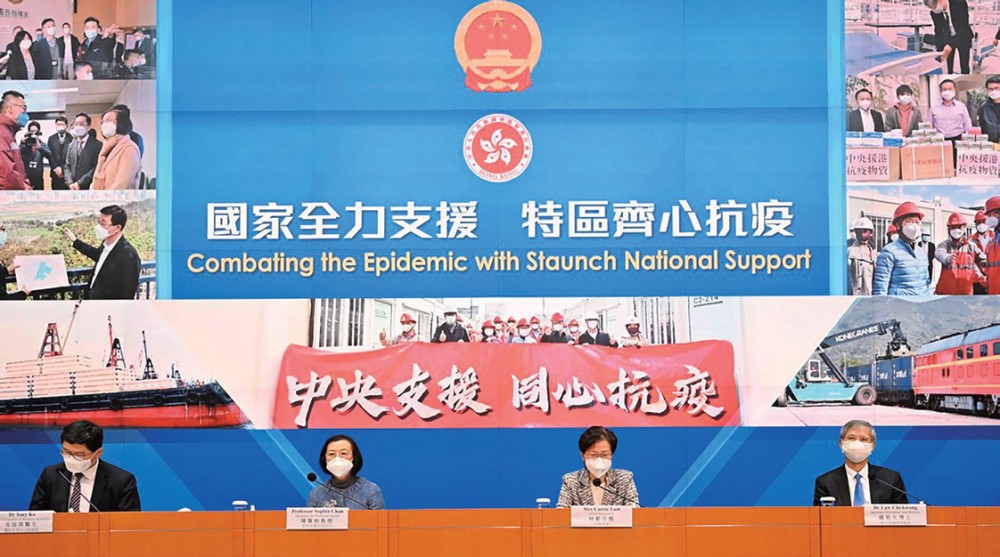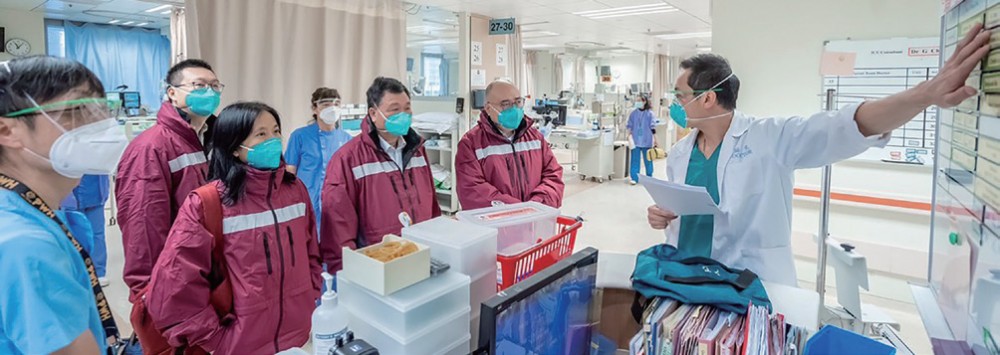Whether it is fighting the epidemic to revitalise the economy or securing opportunities for economic development, the Government must show political courage and determination to resolutely formulate and implement policies in order to truly build a bright future for Hong Kong.
Entitled “Building a Bright Future Together”, the Chief Executive’s final Policy Address in her current term, which is both proactive and enterprising, has established a long-term development framework for Hong Kong. On the economic front, to further integrate into overall national development in view of our country’s positioning for Hong Kong in the 14th Five-Year Plan, the Government has introduced measures not only to support the upgrading of traditional pillar industries, but also to recover the lost ground from missing all those opportunities in the past two decades, especially in the areas of I&T and culture. Regarding industrial distribution, the Government has moved beyond the past development paradigm of focusing on both sides of the Victoria Harbour as the core business districts and introduced the Northern Metropolis with an out-of-the-box mindset and a forward-thinking approach.
Combat epidemic together for economic recovery
 It is a well-known fact that effective epidemic prevention and control is a solid foundation and precondition for re-igniting the economy. The fifth wave of the epidemic, which broke out in 2022, has caused all sorts of hardships to Hong Kong’s residents and business community. A global rating agency even revised its 2022 gross domestic product (GDP) growth forecast for Hong Kong down to 1.5%. Limited by their size, SMEs often bear the brunt of unstable economic and social environments. According to data from the Census and Statistics Department, the current diffusion index (DI) on business receipts amongst SMEs slipped markedly from 46.0 in December 2021 to 37.8 in January 2022. Many industries have been hit, particularly restaurants, retail trade and wholesale trade, which may experience a wave of closings. Even though the Policy Address, in its chapter on “New Impetus to the Economy”, has introduced the Commercial Data Interchange to help SMEs gain access to financing services and stated the setting up of training courses for SMEs to assist them in intellectual property protection, and the Government later launched the fifth and sixth rounds of the Anti-epidemic Fund, some struggling micro, small and medium enterprises (MSMEs) still cannot benefit from these measures because they are not eligible to apply. The Government must adjust its measures appropriately to assist SMEs, which are the cornerstone of Hong Kong’s economy, in order to preserve the vitality of Hong Kong’s economy. In addition, given the new normal for economic activities, consumption behaviour and value chains due to the epidemic, the Government must keep abreast of these new trends and help businesses flexibly adapt and upgrade, including proactively considering raising the amount of the technology vouchers.
It is a well-known fact that effective epidemic prevention and control is a solid foundation and precondition for re-igniting the economy. The fifth wave of the epidemic, which broke out in 2022, has caused all sorts of hardships to Hong Kong’s residents and business community. A global rating agency even revised its 2022 gross domestic product (GDP) growth forecast for Hong Kong down to 1.5%. Limited by their size, SMEs often bear the brunt of unstable economic and social environments. According to data from the Census and Statistics Department, the current diffusion index (DI) on business receipts amongst SMEs slipped markedly from 46.0 in December 2021 to 37.8 in January 2022. Many industries have been hit, particularly restaurants, retail trade and wholesale trade, which may experience a wave of closings. Even though the Policy Address, in its chapter on “New Impetus to the Economy”, has introduced the Commercial Data Interchange to help SMEs gain access to financing services and stated the setting up of training courses for SMEs to assist them in intellectual property protection, and the Government later launched the fifth and sixth rounds of the Anti-epidemic Fund, some struggling micro, small and medium enterprises (MSMEs) still cannot benefit from these measures because they are not eligible to apply. The Government must adjust its measures appropriately to assist SMEs, which are the cornerstone of Hong Kong’s economy, in order to preserve the vitality of Hong Kong’s economy. In addition, given the new normal for economic activities, consumption behaviour and value chains due to the epidemic, the Government must keep abreast of these new trends and help businesses flexibly adapt and upgrade, including proactively considering raising the amount of the technology vouchers.
Integrate into national development for new economic impetus
 On the trade front, in view of our country’s efforts to enhance Hong Kong’s status as an international trade centre as mentioned in the 14th Five-Year Plan, the Policy Address indicated that the Government will strive for Hong Kong to join the Regional Comprehensive Economic Partnership (RCEP) as soon as possible, and it has committed HKD1 billion to support the convention and exhibition (C&E) industry and will expand C&E facilities to inject new impetus into the industry. Nevertheless, besides the aforesaid measures, Hong Kong can still be more proactive. In particular, it can fully play the role of a “super connector” in “dual circulation”, which is a strategy put forward by our country in the light of the changes in the international political situation and the instability of global supply chains. As the Mainland is about to surpass the US as the world’s largest merchandise retail market, the potential of its consumer market will only continue to improve. Hong Kong needs to actively prepare to gradually change its market orientation from exporting mainly to Europe and the US to exporting to the Mainland, promote Hong Kong brands, and support Hong Kong businesses to make further inroads into tapping the Mainland consumer market. In addition, it can use the RCEP opportunity to integrate into regional value chains to promote cooperation between Hong Kong and Mainland enterprises in ASEAN’s industrial parks, especially assisting those enterprises engaged in trade financing, financial management and professional services to tap business opportunities. In the area of financial infrastructure, the HKSAR Government should make every effort to improve the construction of the offshore RMB system in Hong Kong to meet the need for offshore RMB settlement in ASEAN commodity trade and the demand for offshore RMB investment in the international market.
On the trade front, in view of our country’s efforts to enhance Hong Kong’s status as an international trade centre as mentioned in the 14th Five-Year Plan, the Policy Address indicated that the Government will strive for Hong Kong to join the Regional Comprehensive Economic Partnership (RCEP) as soon as possible, and it has committed HKD1 billion to support the convention and exhibition (C&E) industry and will expand C&E facilities to inject new impetus into the industry. Nevertheless, besides the aforesaid measures, Hong Kong can still be more proactive. In particular, it can fully play the role of a “super connector” in “dual circulation”, which is a strategy put forward by our country in the light of the changes in the international political situation and the instability of global supply chains. As the Mainland is about to surpass the US as the world’s largest merchandise retail market, the potential of its consumer market will only continue to improve. Hong Kong needs to actively prepare to gradually change its market orientation from exporting mainly to Europe and the US to exporting to the Mainland, promote Hong Kong brands, and support Hong Kong businesses to make further inroads into tapping the Mainland consumer market. In addition, it can use the RCEP opportunity to integrate into regional value chains to promote cooperation between Hong Kong and Mainland enterprises in ASEAN’s industrial parks, especially assisting those enterprises engaged in trade financing, financial management and professional services to tap business opportunities. In the area of financial infrastructure, the HKSAR Government should make every effort to improve the construction of the offshore RMB system in Hong Kong to meet the need for offshore RMB settlement in ASEAN commodity trade and the demand for offshore RMB investment in the international market.
With regard to industrial structure, although the Government has yet to study and formulate a set of complete and forward-looking industrial policies, the Policy Address has gone out of the box to put forward the Northern Metropolis’ focus on I&T development, which fulfils the Central Government's policy plan to support Hong Kong’s development into an international I&T hub and is conducive to the formation of Hong Kong’s “dual-core metropolitan areas” development paradigm where “the south (Central) is strong in finance and the north (New Territories North) is strong in I&T” and alignment with Shenzhen’s I&T development. The Government can draw reference from cross-border cooperation zones to discuss with the Mainland on easing the restrictions on people from the two places moving in and out of the Lok Ma Chau Loop to facilitate the free flow of scientific and technological talents, as well as to consider giving more policy and funding support to Hong Kong enterprises for R&D in the Greater Bay Area and the commercialisation of R&D results. The Policy Address also expressly stated that Hong Kong has to meet our country’s needs by strongly pushing forward development in life and health disciplines, which are frontier fields highlighted in the 14th Five-Year Plan. Actually, Hong Kong always has a solid foundation in scientific research in this area, but its supporting facilities are insufficient. The industry urgently needs the Government to formulate short-, medium- and long-term development blueprints for research in life and health sciences, and start planning for the San Tin Technopole and allocate land in a forward-looking manner as soon as possible so that enterprises can form a cluster effect and improve land efficiency. In addition, the restructured Innovation, Technology and Industry Bureau should set clear and long-term policy objectives for “re-industrialisation” and improve the Re-industrialisation Funding Scheme (RFS), such as raising the ratio of the Government’s funding contribution to that of the company. To address the loss of and gap in technical talents, it should devote great efforts to develop vocational and professional education to train more young people, and people who want to develop a new career, to join the I&T and manufacturing industries.
Whether it is fighting the epidemic to boost economic recovery or securing new opportunities for economic development, the Government must show political courage and determination to resolutely formulate and implement policies in order to truly build a bright future for Hong Kong where the Government functions well and the people live in harmony.
This is a free translation. For the exact meaning of the article, please refer to the Chinese version.
Address : Rm 703, Legislative Council Complex, 1 Legislative Council Road, Central, Hong Kong Tel : 2576-7121
Fax : 2798-8802
Email: legco.office.liao@gmail.com




